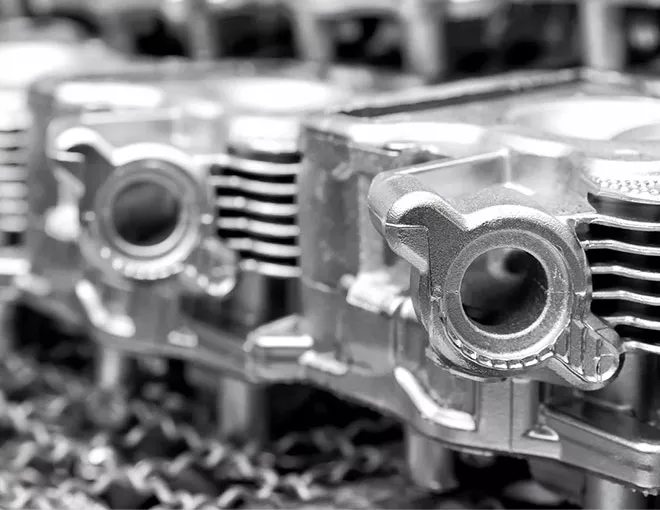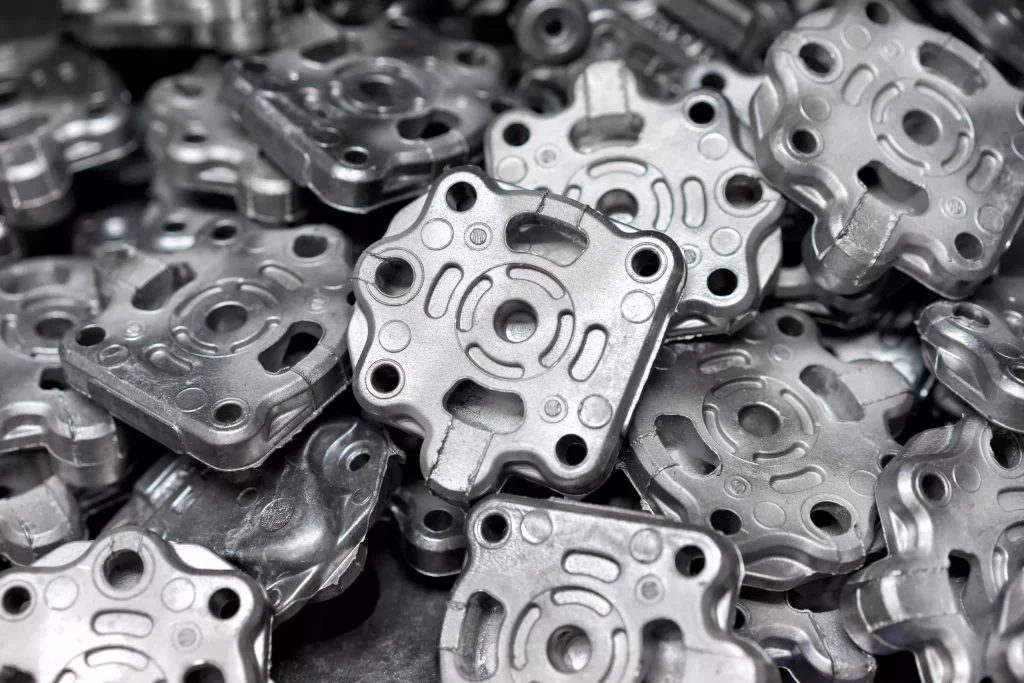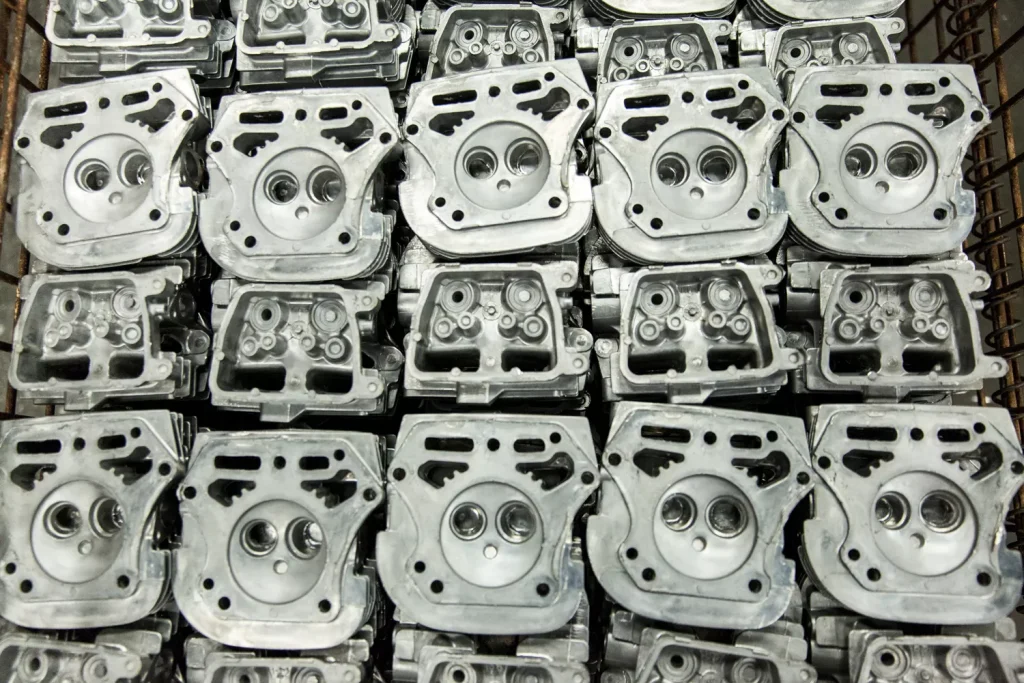Die Casting Services
Elimold’s die casting services offer high-output production capacity, low cost, and flexible part design options making it an appealing casting choice for non-ferrous metal products. Our die casting facilities are equipped to handle a variety of designs, materials, and manufacturing needs across multiple industries. Continue reading to learn more.
Leading Supplier of Quality Die Castings
Elimold is a custom machine shop that produces precision aluminum and zinc castings using the high-pressure die casting process. All castings are trimmed, machined, and finished to customer specifications. Through our experienced staff, Elimold provides engineering services from design concept, prototyping, tooling, and production, to machining and metal finishing to complete assembly.
Our full-service capabilities make us your one-stop die casting supplier. We will serve as the single party for everything from initial design assistance to precision machining, metal finishing, and final assembly.
Our project managers and experts personally review and hand-quote each die casting project to ensure we meet your unique needs while providing a fast and easy manufacturing experience.

Precision Die Casting Company
Elimold is the perfect combination of quality, delivery and value. At Elimold, everything we do is driven by this motto. We believe that quality products without excellent customer service are unacceptable, a belief that every Elimold employee firmly believes in. Since its inception, Elimold has been committed to building, developing and cultivating long-term partnerships with our customers. We do this by sticking to what we do best, which is producing high-quality die-cast parts at very competitive tooling and unit part prices. Helping our customers gain a competitive advantage and position in their respective markets. Because our business is built on flexibility, we are able to serve a wide range of demanding market sectors, including industrial and consumer products, electric motors, commercial construction, automotive, heavy truck and automotive aftermarket, and military and defense. The core of our business model is aligned with scheduling flexibility, responsiveness, unit manufacturing, stock availability, inventory and Kanban procedures, single minute die exchange (SMED) concepts, automation and a relentless pursuit of Six Sigma quality, all of which allow us to think big and start small in our company operations, and each element is a factor that enables us to meet shorter lead times and tighter production time windows. Elimold’s management team and engineering team have over 20 years of experience in die casting manufacturing. We have the in-house die casting facilities, equipment, experience and technical knowledge to produce the high quality products we are proud of. We look forward to providing you with complete customer satisfaction and fully stand behind our professional service and commitment to meet or exceed your expectations of a die casting manufacturer.
Our Casting Machines and Capabilities
Ranging from 280 tons to 1,750 tons, our machines can mold parts to a maximum of 13 kg (about 29 lb) and 1,500 by 1,100 mm (59 inches by 43 inches). Our in-house tool shop grants us total control of the entire process and ensures only the highest-quality materials are used. Our experienced engineering staff uses advanced mold flow software to control porosity even in large, open-geometry parts.
Every part we produce has a documented process control program to ensure consistent products lot to lot. Furthermore, our ISO material control system guarantees there is no metal contamination whatsoever. A range of casting processes are available: air set, continuous, counter pressure, densification, high-pressure, hot chamber, impregnation, low-pressure, pressure cast, Shaw process, static, tilt-poured, vacuum, and vacuum impregnation.
Specific mold types used include ceramic, cope and drag, high-pressure die, low-pressure die, plaster, precision ceramic shell, shell, and solid. Available process materials include dry sand, foam, green sand, oil sand, sand, and wax.
All pieces hold tight tolerances to meet — and even exceed — strict industry standards. We can handle a range of production-volume needs, whether clients require prototypes, low- or high-volume orders, or blanket orders. Lead times are quoted on a job-to-job basis, but rush orders are available.
We Provide One-Stop Die Casting Solution
We provide complete turnkey solutions from design to delivery, using the latest technology and industry-standard materials.Our metallurgical expertise ensures we use the best-suited alloys for each project to meet the toughest requirements.
Prototyping & testing
Our team utilizes computer-aided design combined with simulation software to produce rapid prototypes as well as die casting examples, and conduct rigorous testing to validate designs.
Surface treatments & coatings
We offer a range of surface treatments such as anodizing, electroplating, and powder coating to enhance the durability as wellas the performance of components.
Non-destructive testing & inspection
Our in-house testing facility uses X-ray inspection, dye penetrant testing, and ultrasonic testing to ensure the integrity of cast components.
Supply chain management & logistics
Our supply chain team oversees material sourcing, production scheduling, and delivery logistics to provide seamless, yet efficient service to our clients.
Benefits of Working with a Full-Service Die Caster
Today, more and more industries are using die casting processes in their applications. One of the advantages that die casting offers to these industries is the ability to produce in large quantities without sacrificing strength or durability, while reducing costs. Elimold provides die casting solutions for a variety of industries. Whether you need a component die casting or an aluminum die cast housing, you can rely on us to produce quality parts to your specifications. Our services include rapid prototyping, product design, custom tooling, and finishing (depending on your project).
Elimold has the knowledge and capabilities to cast quality components for a variety of industries. With a wide range of casting materials and the flexibility to accommodate rapid prototyping and high-volume production, we are your trusted supplier of die castings. Therefore, choosing to work with a full-service die caster instead of managing multiple processes and suppliers yourself can help free up your company’s resources, shorten lead times, simplify logistics and inventory management, and save money. In addition, this can improve design and reduce overall costs because full-service die casters look for ways to add value in all processes.
At Elimold, our die casting engineers will work with you to fully understand your product, its appearance and performance requirements, and the expected environment. With this understanding, our engineers can help you optimize your design for maximum performance and overall value. In addition, advance planning and analysis by die casting engineers can recommend cost-saving measures or prevent costly mistakes during the project lifecycle.
Die Casting Technical Standards
| Dimension | Standards |
| Minimum part weight | 0.017 kg |
| Maximum part weight | 12 kg |
| Minimum part size | ∅ 17 mm × 4 mm |
| Maximum part size | 300 mm × 650 mm |
| Minimum wall thickness | 0.8 mm |
| Maximum wall thickness | 12.7 mm |
| Tolerance class for casting | ISO 8062 ST5 |
| Minimum possible batch | 1000 pcs |
Die Casting Material
Several different metal materials are available to choose from when manufacturing using die casting. The material you choose will depend on your intended use for the product. For instance, cast aluminum parts are common in aerospace or automotive applications where corrosion resistance and weight reduction are essential factors. You can learn more about the main types of die casting materials we offer in the sections below. If you have a specific material request, just let us know!
Aluminum
- A360
- A380
- ADC6
- ADC10
- ADC12
- ALSi12
- ALSi9Cu3
Zinc
- Zamak3
- Zamak5
- Zamak8
- Zamak12
Magnesium
- AM50A
- AM60B
- AZ91D
- AZ63A
Other Casting Material
- Titanium
- Copper
- Bronze
- Steel
- Stainless Steel
- Foundry Iron
Die Casting Surface Finishing
Choose from our various surface finish options to increase corrosion resistance and add vibrant colors to your die cast parts.
As Cast
Provides a basic, functional finish for die casting products with relatively smooth surfaces and minor tool marks, suitable for non-cosmetic applications.
Polishing
Enhances the surface smoothness and shine of metal casts, reducing surface roughness to achieve a high-gloss finish that is visually appealing.
Sand Blasting
Offers a uniform, matte finish by blasting the surface with fine particles, which also helps to remove small imperfections and prepare the surface for further treatments.
Anodizing
Increases corrosion resistance and wear properties of aluminum cast parts, while also adding the option for coloration, enhancing both durability and aesthetics.
Powder Coating
Creates a thick, uniform coating that is tougher than conventional paint. Ideal for adding vibrant colors and additional protection against corrosion and chipping.
Brushed Finish
Produces a distinctive look with a pattern of fine lines on the metal surface, which can help in hiding fingerprints and minor scratches, adding both aesthetics and practicality.
Get Your Custom Die Cast Parts
Our team’s tool design experience and use of industry-leading software and mold flow analysis tools ensure the production of high-quality die-cast parts. We support both high-volume production and low-volume production (soft tooling).
Click the button below to submit relevant part drawings, 3D files, and other information. We will ensure prompt processing and ensure you receive a quote as soon as possible.
What is Die Casting?
Die casting is an efficient process that can be used to manufacture fine, high-volume metal parts. The process uses specialized molds, known as die casting dies, designed to produce multiple parts simultaneously, ensuring efficiency and consistency. Commonly used for metals such as aluminum and zinc, die casting involves melting the metal and injecting it into these molds under high pressure.
The subsequent rapid cooling and solidification captures the intricate design and detail of the part, reducing the need for extensive secondary operations. While die casting eliminates all or most of the secondary operations required to manufacture metal parts; however, post-machining is common to meet tighter, function-critical tolerances. Die cast parts can also be post-processed to achieve any of the surface finishes that their respective CNC machined counterparts can achieve.
Types of Die Casting Methods
The two main die casting processes are hot chamber and cold chamber die casting.
Cold Chamber Die Casting
Within this die casting application process, molten metal is poured into the cold chamber or cylindrical sleeve by ladle. A hydraulically operated plunger seals the cold chamber port and forces the metal into the die cavity at high pressure. Cold chamber die casting machines are used for aluminum alloys or Zinc alloys with high melting points.
Hot Chamber Die Casting
Hot chamber die casting machines are primarily used for zinc alloys, copper, lead, and other low melting point alloys. The injection mechanism of a hot chamber machine is immersed in a molten metal bath of a metal holding furnace. The furnace is attached to the machine by a metal feeding system called the gooseneck.
Advantages of Die Casting
Die casting services provide a number of advantages. These include:
- The capacity to design and create complex shapes with a high degree of accuracy and reliability.
- Cost savings through the bulk production of parts and components from a single design mold.
- Combining multiple components without the need for an assembly line.
- Reduction of scrap or waste.
- Faster production cycle times.
- Die casting allows for the mass production of complex parts and components in less time and at a lower cost.

Prototyping Die Casting Parts
Prototyping provides design verification, which is the opportunity to discover design flaws before committing to production-level tooling. While it is not necessary to prototype every design, sometimes doing so can save time and money. Generally, the later in the development cycle a design error is discovered, the more costly it is.
When a mold needs to be scrapped or reworked, the impact is obviously in terms of cost and delay. However, reworking die casting molds also increases costs, shortens mold life and can negatively impact quality. Using today’s prototyping technology can help manufacturers avoid these stressful situations.
Elimold offers a variety of prototyping methods to choose from. Choosing the option that best suits your application depends on trade-offs. For example, some options can use plastic or metal 3D printing or billet CNC machining, which are relatively inexpensive for small batches because no tooling is required. However, the mechanical properties of 3D printed or machined parts are very different from those of die castings. Evaluating which prototyping process is best for your needs requires considering quantity, time, mechanical properties, dimensional accuracy, surface finish, wall thickness, appearance requirements, and more. An excellent new energy die casting supplier can guide you in choosing the right option.

Is die casting right for your product?
The die casting process is the fastest option available for producing exact, non-ferrous metal products. Because this method utilizes reusable molds, it offers high-speed production of parts and has the flexibility to create a wider range of shapes and sizes than other casting methods.
Die casting can be completely automated, and its reusable molds also make it an affordable option. This technique is used to manufacture commercial, consumer, and industrial products. Die casting is ideal for medium-sized parts with more complex structures.
Common products and use cases
- Household fixtures
- Medical Valves
- Locks & Deadbolts
- Connector Housing
- Car Parts
- Gears
- Engine Fans
- Bezel for Smartwatches
- Camera Lens
- Water housing
Industries Served
At Elimold, we offer our premier die casting services to a diverse number of industries.
- Industrial
- Aerospace
- Robotics
- Automotive
- Radar
- Medical
- Networking
- Recreational
- Public Transportation
- Telecommunications
Ready to get started on your Die Casting quote?
Our pressure die casting engineers are ready to work with you to make sure you get great parts fast. When you submit your 3D design files, we will consult with you to ensure design for manufacturability in order to get parts that meet and exceed your expectations.
